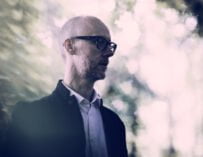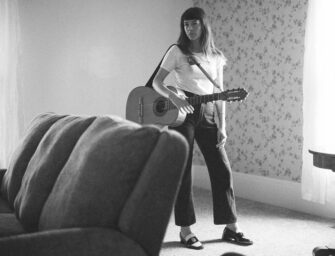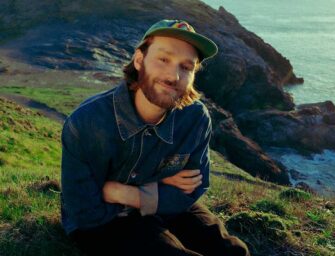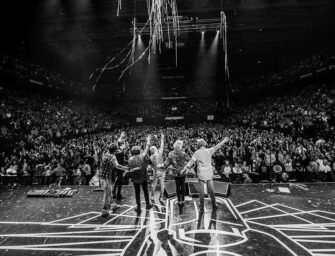
Bonnie ‘Prince’ Billy: “The way I approach making songs, tours, and records far more resembles a film set…”
Ahead of the release of a new documentary about him, we catch up with the legendary alt-country songwriter Will Oldham
Will Oldham, better known by his musical alias Bonnie ‘Prince’ Billy, has an almost unique standing in the world of alt-country. In his various guises, he has contributed many of the genre’s greatest records, in particular the 1999 masterpiece I See A Darkness. His canon of work is as prolific as it as raw. Under his various guises, and alongside several collaborators and bands, he has released an astonishing catalogue since his 1993 debut, Palace Brothers’ There Is No-One What Will Take Care Of You.
His latest project is a collaboration with the Italian film maker Simo Valley which follows Bonnie ‘Prince’ Billy and The Cairo Gang, as well as support act Tonnie ‘Broeder’ Dieleman, on their 2014 tour of Holland. The documentary will be part of the Doc’N Roll Film Festival, taking place in London between 2-13 November in London.
Ahead of the festival, we caught up with the great man to chat about the documentary and the similarities between making music and film.
How was the The Royal Dutch Tour for you?
“There have been a few major tours for me. One was in New Zealand in the beginning of 2006, one was in the western USA in 2002 or so, and The Royal Dutch Tour is the third. These tours were each worlds unto themselves, where the music, companionship and geography combined to make something far greater than the sum of the parts.”
What did you enjoy most about working with Simo Valley?
“We have been acquainted for many years now. Simo came to us with the idea to shoot the tour and was open to our reservations about privacy, and she knew that the tour for us was about more than just what happened during each evening’s set. Simo had been around for previous tours, shooting awesome still images, and she knew that we like to dig into our environs. She hung back and made her process as invisible as she could, with occasional gentle prods to get a moment or an image that she knew would complement the rest of her footage.”
Did the performances have to change in any way because they were being filmed?
“We’ll never know how the filming might have affected the performances. We knew she was there. But she worked with available light and available sound. It felt like she wanted to document what we were all experiencing, and to contextual the whole venture, and was willing to let the action in front of the camera define what the film was to become. Of course, she had some very developed ideas of how the film would be structured, hence her interviews with authorities on each location.”
How has the experience inspired you and has it led to any songwriting?
“Immediately, Broeder Dieleman and I set about making a 7-inch in which we would cover one of each other’s songs. Tonnie sings in Dutch, and so he translated a Bonnie song into Dutch and I worked with a Dutch friend on translating a song of Tonnie’s that I loved to hear each night, Gloria. Translating a song is not a literal word-for-word process. Figuring out how to make the song come across in English, which included some geographic modifications, helped me understand where Tonnie might be coming from at times.
“I CAN’T SING FROM WILL…I DON’T YET KNOW WHO OR WHAT WILL IS”
“His song mentions a small body of flowing water near where he lives, and I changed the lyric so that a creek near our house in Kentucky was the water referred to. In recent months, I’ve been asked to write another song about this creek, and having dug into the musicality of the place with Tonnie’s song, I was prepared.”
Have any other music documentaries had a similar influence on you?
“There are two documentaries about Leonard Cohen and his music that are influential to me. One is called The Song Of Leonard Cohen, that centres around his life and music in the late 1970s, and the other is Bird On A Wire, about a Leonard Cohen tour that happened in Europe and Israel in the early 1970s. Cohen is an artist whose practice extends beyond the song product or live show; everything is a part of a whole.”
Are you able to draw any parallels between the film-making and your own songwriting?
“As far as approaching any given project, it probably makes more sense to draw lines from creator to creator rather than from medium to medium. I may have more in common with a particular filmmaker than a particular song-maker. In fact, since I grew up watching plays being produced and films being made, I’m sure that the way I approach making songs, tours, and records far more resembles a film set than most other musical production settings.”
Is this the closest your acting and music have come to merging together? Do you ever consider Bonnie ‘Prince’ Billy to be a role?
“This wasn’t like acting at all. We were set pieces here, we were not directed by Simo. The closest thing to a musical/theatrical hybrid for me was probably the shooting of David Lowery’s short film Pioneer, in which I submerged myself into the written text and was allowed to participate in 30-minute unbroken takes. This is what it is like to sing; I enter the song space and don’t come out until the dust has settled and the damage done. Bonnie is a role. I can’t sing from Will because I don’t yet know who or what Will is. I will never know. I can know better what Bonnie might be.”

Bonnie ‘Prince’ Billy performing at the Granada Theater in Dallas, TX in 2009. Photo: Rich Anderson/Wikimedia Commons
Does that mean you occupy a certain headspace / character when you’re writing a Bonnie ‘Prince’ Billy song?
“It’s necessary to leave the earthly realm and enter the astral plane in order to feel qualified to begin making a Bonnie song. Or any song, if I am singing someone else’s piece. The Bonnie songs are all found out in the woods or in the big cities, buried in cornerstones or mounted on walls”.
Musical performances often make for truly engaging viewing, do you think the songwriting process can be accurately captured in the same way? Is songwriting something that can be dissected and understood?
“Songwriting could be captured in this way; since much of the heavy lifting occurs internally, it might take a special cinematographer and/or editor to reveal something about how a song is built. Many of the pieces of a song are definable, almost like you could buy the parts in a hardware store. Progressions, repetitions, durations. Just find the right aisle. And then as far as actually understanding, that will always depend on the viewer/experiencer. Is she or he capable of understanding what s/he is witnessing? Oftentimes, watching someone else work is the crucial key to unlocking the big next step in our work.”
As well as touring with The Cairo Band for the film, you’ve recently worked with Matt Kivel, Angel Olsen, Trembling Bells and Yusuf Islam [formerly Cat Stevens]. Do your collaborations tend to happen naturally or will you seek them out specifically?
“For the most part, the collaborations happen very naturally. Kivel and I are long-distance pen pals. One day music became a part of the discussion. Working with Angel came about because I had, for years, wanted to find someone who could sing Dagmar Krause’s part to my Kevin Coyne in tackling a full-record live cover set of their Babble record. Emmett [Kelly] heard Angel in Chicago and called me and said that he thought he’d found the best ‘Babbler,’ and he was right.”
Do you find collaborating more enjoyable than working on your own?
“The reason that I do this is to discover, create, reveal and/or maintain connections with others. So collaboration is the pinnacle of musical experience. A couple of years ago, I made a record almost completely by myself. Then I played a heap of shows as a solo performer. In order for any of this activity to make sense to me, I needed to frame it as a deliberate and desperate act, as if I had come to the edge of a cliff at the end of the world with only one obvious exit.
“WRITING IS SOMETHING THAT NEEDS TO BE PREPARED FOR…”
“Then I needed to look around and realize that there was another way, there were invisible collaborators who could airlift me out of that peril. These invisibles were/are the audience. I used to create music for an imagined audience, but I realized recently that I could accept that the audience was no longer imagined. They have become active collaborators. So that when I am on stage ‘by myself’ making music ‘alone’, in reality I am engaged in an active creative dialogue with the audience. They are completing the music then and there.”
Is the writing element something you prefer to do alone? Are the collaborations more about the recording and performance side of things?
“I have yet to try the old school Nashville style of collaborative writing, where two or more writers sit in a room together and make up songs. All of the co-writing I have done up to this point, except for one or two songs, has been done over long-distance. Writing is something that needs to be prepared for and then allowed to happen, and it could be a challenge to coordinate such events with another person. But many of the more rewarding and important songs that I have been a part of are the co-written songs, specifically with Emmett Kelly and Matt Sweeney.”
Considering how busy you are currently, how do you make time for writing?
“In the past, I would make time with a disciplined regularity. These days, I am writing when I am asked to write. Like many young modern couples afraid of bringing a child into a doomed and daunting world, I am loathe to instigate the life of a song knowing that I am to be its sole parent and provider. So I stay in songwriting shape, waiting for someone to ask me to make something for their use and purpose.”
What do you think the biggest difference is with regards to the way that you write now and how you wrote when you were starting out?
“When I was starting out, writing songs was like swimming at night. It felt great, but I rarely knew quite where I was. Nowadays, making a song is about choosing the unknowns and juxtaposing those with the knowns.”
What’s next for you? Do you have any big ambitions left to fulfil?
“There is a record that I would like to make with Emmett still. We’ve been talking about it for years. Maybe we will make it this spring, or maybe never.
“I think about writing longer songs. I think about performing with greater regularity. I think about living in Japan and fishing in a river every day. I think about bringing down awfulness and injustices with the force of music. I always want to sing better, and my instrument changes so it will remain a never-ending task. I’d like to write more song for other people to sing. I’d like to hear June Tabor sing one of my songs.”
Interview: Duncan Haskell
For more details about the festival, check out the website docnrollfestival.com/


































Related Articles